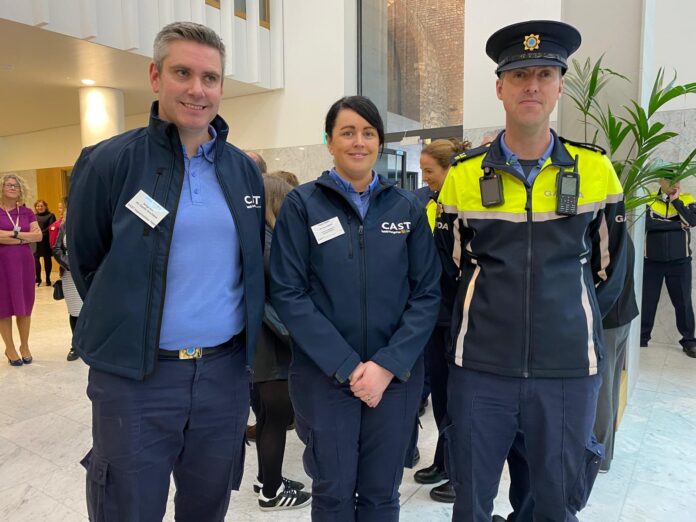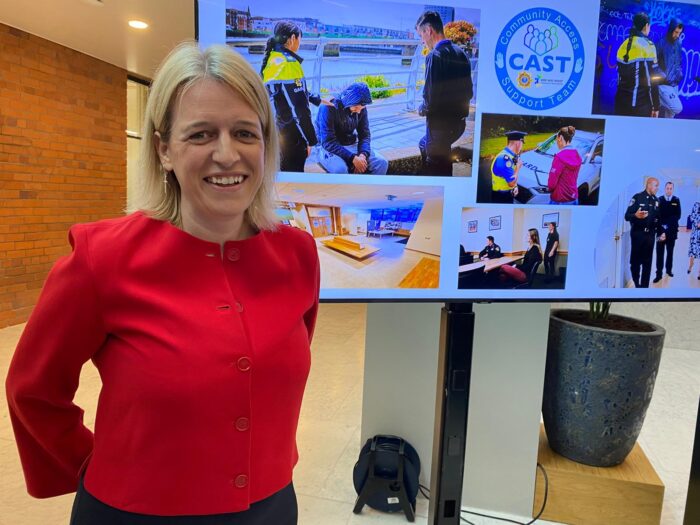
THE Regional Executive Officer of the HSE Mid West, Sandra Broderick, has revealed that a group of just 300 people paid a combined 5,000 visits to the emergency department at University Hospital Limerick (UHL) in the last year.
Ms Broderick was speaking at the launch of the Community Access Support Team (CAST), a pilot project launched in Limerick this Monday (October 7) which will see Gardaí, the health services, and support agencies co-operate out of one base in Henry Street Garda Station to help people with mental health issues.
At the same event, held in the Gardens International building in Henry Street, Minister for Mental Health and Older People, Mary Butler, also formally announced the funding, for the first time, of a specific eating disorder team for the Child and Adolescent Mental Health Services (CAMHS) in the Mid West, with provisions for 10 new posts.
Highlighting figure, Ms Broderick said that it is believed that while many of the people who are repeat visitors to the UHL ED come for ongoing physical issues, there is a cohort who may also be helped by the new scheme.
She said the scheme, the first of its kind in Ireland, is “hugely important in supporting those who have issues around mental health and substance abuse”.
“This pilot is all about enabling them to access support in the community before they have to go to the emergency department.
“It won’t eradicate (the multiple attendances) entirely, because many of those people may also have physical issues … but this programme will make fundamental difference to those people.”
The CAST team will be based at Henry Street Garda Station and will aim to reduce future presentations and interactions with emergency services through community follow-ups and the management of complex cases.
Ms Broderick explained the “approach of the CAST team will also be trauma-informed, recognising that a significant proportion of our service users have had trauma in their lives and that what they have endured is often a root cause of their presentation”.
“CAST is also very conscious of improving the connection between the services and the loved ones of people in distress. The CAST pilot provides for a social care worker to follow up with those closest to the service user and who so very often can be active partners in recovery and healing.”

Minister Butler added that “a key priority will be to divert a small but highly vulnerable group within our society away from prison and towards the healthcare system, through improved sustained engagement with key services.”
The Minister also gave details of the new eating disorder service, which she says is among a number of measures in the mental health programme, along with the creation of an early intervention psychosis team.
Outlining the CAST project’s workings, Minister of State at the Department of Justice for Law Reform, International Law, and Youth Justice, James Browne explained that “when a relevant 999 call has been triaged, the on-scene response brings together members of An Garda Síochána, the HSE, and the wider CAST Team”.
“This approach reflects the shared goal of providing a compassionate and effective response to people in distress, and by offering the right support when it is most needed, reducing the likelihood of future offending and building safer communities overall.”
Crisis response and community support
The CAST project is based on international experience demonstrating improved outcomes for adults requiring the intervention of a policing response at times of a mental health crisis or situational trauma. It follows extensive engagement between An Garda Síochána and the HSE with Crisis Intervention Team members in other jurisdictions, and those with lived experience of engaging with the Gardaí at times of a mental health crisis.
The CAST project comprises two modes of delivery to people in crisis and or situational trauma within the Limerick Garda Division – crisis response and the new community support forum.
On-scene crisis response will involve trained members of An Garda Síochána working with their existing operational unit, supported by an assigned clinical nurse specialist and other members of the CAST Team.
The CAST team will be based in Henry Street Garda Station and will follow up with individuals based on needs identified during response.
When not responding to calls, staff will be linking in with external agencies, engaging in outreach to homeless and addiction services, following up on previous call-outs, and providing ongoing intervention based on need.
The project also sees the creation of the community support forum, comprised of identified statutory agencies and approved support services. An independent person from Limerick City and County Council will chair the forum on a monthly basis. The aim of the forum is to provide an integrated approach to working with people in crisis.
The CAST team will be staffed by HSE Mid West professionals and members of An Garda Síochána, both located at Henry Street Garda and working collaboratively.


